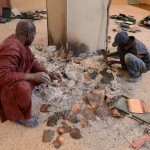
In the scale of assaults that mankind inflicts on mankind, it’s hard to argue that biblioclasty, the torching of libraries, much compares with the worst crimes that all too often occur in times of war, conquest, and oppression. We’re informed by our own humanity that crimes against objects should be near meaningless next to destruction of life.
As inarguable as that is we’re also informed, by long tragic experience, that oppression goes away sometimes, and sometimes communities rebuild. And it’s at that point, stretching thence to generations unknowable, that this assault against knowledge, against the culture of the written word, is felt most deeply. Biblioclasty is an attack on unborn minds. It is the erasure of their most valuable birthright.
When I set out to learn more about the deliberate destruction of libraries, I quickly became overwhelmed by the multitude of horrifying historic examples. Most of us know about the Library of Alexandria and its posterity-robbing end. I thought my research would start there, and in a large way focus there.
But no, Alexandria is just one glaring example. Hardly the first and far from the last. The collecting of books, or at least scrolls and papyri, long predated Alexander the Great’s founding of his eponymous Nile Delta city. And whenever they’re collected, I learned, they’re subject to burning.
Social upheavals is probably the most easily identifiable spur for book burning. It covers the most common circumstances: sectarian religious strife, wartime sieges, inexplicable public furor. Hitler, Stalin, a few Chinese  emperors, and more than one Muslim caliph did it to hobble the intelligentsia and to condition future slaves. Not a few regimes have done it because they deem an educated populace ungovernable. It’s been done to eliminate perceived blasphemies, to hide inconvenient historical truths, to sway contemporary opinions by annulling collective memory.
emperors, and more than one Muslim caliph did it to hobble the intelligentsia and to condition future slaves. Not a few regimes have done it because they deem an educated populace ungovernable. It’s been done to eliminate perceived blasphemies, to hide inconvenient historical truths, to sway contemporary opinions by annulling collective memory.
The Library at Alexandria was actually burned three times–once by Julius Caesar, later by early Christian zealots, finally by the first caliph. The explanation he gave for his order is typical: he said the books would either be in opposition to the Koran, in which case they’re blasphemous. Or they’re in accordance, thus superfluous. Burn them all, he said.
The islamists who recently swept across northern Mali, prompting the first French military action in memory, seemed to have been following similar orders. They captured the ancient salt-trade crossroad city of Timbuktu months ago, and threatened to burn its centers of learning almost from the beginning. But it wasn’t until French tanks were within sight in late January that the fleeing extremists destroyed the UNESCO world-heritage site, Ahmed Baba Institute.
 Their procrastination, or whatever it was, allowed a few very brave librarians and curators spirit away the cream of the institute’s ancient collection–at least 28,000 manuscripts and documents, some more than a thousand years old.
Their procrastination, or whatever it was, allowed a few very brave librarians and curators spirit away the cream of the institute’s ancient collection–at least 28,000 manuscripts and documents, some more than a thousand years old.
It’s unknown how many books were lost, or how many of Timbuktu’s estimated 300 other libraries were attacked. It’s thrilling and rare that so much was saved, but still so much is gone forever. Multiply that by all the book burnings, all of history’s assailment of libraries—then you’ve some inkling of what the  biblioclasts are doing to us.
biblioclasts are doing to us.
What inconceivable intellectual treasures might have been lost, any of those times Alexandria burned? Or the Lyceum, in Athens, which likewise was sacked numerous times, by successive invaders. Are those classical examples, or any of the thousands that followed in the Middle Ages and Renaissance, worse than the burning of Sarajevo’s libraries in 1992? It’s impossible to say, I think, because it’s impossible to assess what’s been lost.
The mightiest library known today, our age’s Alexandria, is the Library of Congress, which surpassed 100 million volumes at the turn of the last century. That institution was legislated into being in 1800, incorporated itself with an initial purchase of 740 books, and has endured with a quest toward the preservation of as much knowledge as possible. No way of guessing how long or in what way the Library will fulfill that mission—but if there ever was any library immune to biblioclasty, surely it’s this one.
But burn it did. On August 24, 1814 all three thousand titles in the Library of Congress were put to the torch.
 When the most dire things happen to us, when they happen to us personally or collectively, our first instinct is to wish nothing so horrible should happen again. The second is to prepare for it to happen again.
When the most dire things happen to us, when they happen to us personally or collectively, our first instinct is to wish nothing so horrible should happen again. The second is to prepare for it to happen again.
So wish though you might, and wish though we do that the book burnings stop, they won’t. Bigots will burn whatever foreign or liberal titles they say are intolerable, then despots and tinpots will destroy larger and more important collections. Someday somewhere bigger monsters will rise, with bigger ambitions, and they’ll build bigger book pyres. No library is ultimately safe in a world like that. Maybe literacy and learning themselves aren’t.
I’ve no how idea how you prepare for that nightmare of a future, but I fear that’s exactly what we must do.